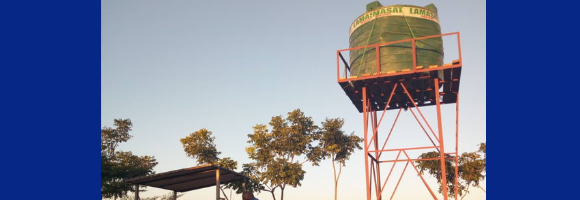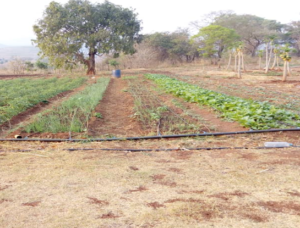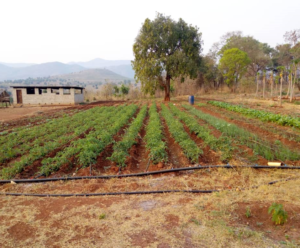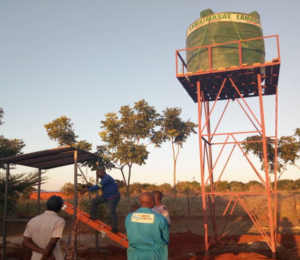Provide Clean Drinking Water in Zambia

As I write this letter to you, nearly five million Zambians do not have access to clean water and more than six million live without access to sanitation facilities. The young men in our seminary are affected by Zambia’s water crisis as well.
“We forget that the water cycle and the life cycle are one.”
Jacques Yves Cousteau (1910-1997)
I want to take this opportunity to thank you for all that you do to make the work of the Missionaries of Africa possible. Your kindness, caring and generosity enable our missionaries — not only to provide basic necessities such as food, clothing, shelter, water, medical supplies and health care for those in need, but your donations also support the work of many of our pastoral and educational programs. And each of our missionaries knows that our friends and benefactors are the partners who sustain our ministry!

Water from the borehole well is desperately needed for the vegetable garden.
The young men in our formation program who are studying and training to become missionaries themselves are also keenly aware of the value of your support. Even though it may still be years before many of them are ready to work in the missions — they are already aware that your financial support is vital to our service among the poor and those in need. And since Lavigerie Formation House (one of the centers where our seminarians are trained) is located in Chipata, Zambia, the young men there are also keenly aware of the tremendous value of water.
As I write this letter to you, nearly five million Zambians do not have access to clean water and more than six million live without access to sanitation facilities. The young men in our seminary are affected by Zambia’s water crisis as well.
“We need to drill a borehole well to ensure that our seminarians and those in the community will have a reliable source of fresh drinking water,” writes Fr. Felix Phiri, who is in charge of the Missionaries of Africa in that region. “Due to the unreliability of rainfall in the area, a source of water is needed for the vegetable gardens, fruit trees, and other plants grown to help sustain our seminarians. Thankfully, so far we have harvested about 100 bags of maize, and enough beans that have provided enough food for our students as well as some that can be sold to support the center. But without a reliable source of water, growing anything is very risky.”

Planting trees helps the environment and provides shade to protect the soil.
“After we drill a borehole well, we also hope to install solar panels so as to have electricity for pumping the water,” Fr. Felix continues. “Additionally, the crops and trees we plant will help create a green space . . . occurring as the trees provide shade — thus protecting the ground from the scorching sun.”
“Our seminarians and the local community will provide the labor to install the solar panels as well as the water storage tanks. But we need financial assistance to drill the borehole and then to purchase the solar panels, water storage tanks, steel and pipes for the water delivery system. I hope you can help us!”

Workers assemble a steel stand for the solar panels.
As I read Fr. Felix’s letter, I was reminded of how vital water is for all of us — and I hope you will take time to support water conservation efforts in your own community. You could start by doing something as small as making sure that your dishwasher or washing machine is full before running it. Also, taking a shower rather than a bath saves an average of about 15 gallons of water!
I also hope that you will send a donation to help the seminarians at the Lavigerie Formation House in Chipata, Zambia, get the water they need! While I am hoping that we can raise at least $34,500 for this and other water projects in our missions, please know that any donation you send will help in some way. No contribution — whatever the amount — is too small to make a difference. Once again thank you for all that you continue to do for our missionaries and those in need.
Your Missionary Friend,
Denis P. Pringle
Director of Development
